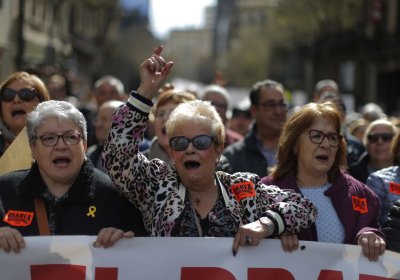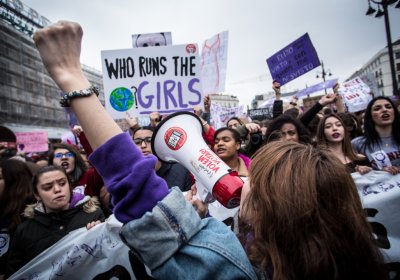The legacy of Vladimir Lenin, one of the most prominent and influential figures in the history of the labour movement and revolutionary praxis, remain valid 150 years after his birth, writes Julian Coppens.
Julian Coppens
In regional elections in Andalusia on December 2, the outgoing government of the Spanish Socialist Workers Party (PSOE) was defeated after 40 years in power. Defeat came at the hands of a fractured yet radicalising right and high levels of abstention on the left.
“La Manada” (The Wolf Pack) is the name of a WhatsApp group chosen by five men to organise a trip to los sanfermines — the running of the bulls — in Pamplona, Navarra. During the festival, in the early hours of July 7, 2016, they gang raped an 18-year-old woman in a small room under the stairwell of a block of flats.
Three hours later, one of them shared a video of the attack in another male-only WhatsApp group with 28 members, called “Danger”. One of the five was an off-duty National Guard officer, another a soldier. During the trial, evidence of another attack committed by four of the five several months earlier was uncovered.
Despite this, although the trial found the men guilty of sexual abuse, it cleared them of rape.
The announcement by Spain’s right-wing Popular Party (PP) government of a miniscule 0.25% rise for pensions has brought pensioners out onto the streets in the hundreds of thousands in recent weeks, writes Julian Coppens from Merida in the Spanish state.
Of all the International Women’s Day (IWD) demonstrations held in an unprecedented 177 countries on March 8, the Spanish state stood out as the site of the largest mobilisation for women’s equality. In fact, it was the greatest mobilisation for women’s right in history, with almost 6 million people — overwhelmingly women — striking and demonstrating in about 120 cities and towns.
More than 200 people attended the first rally organised by the Public Housing Defence Network in Debney Park, Flemington on October 15.
The network was established to fight the Daniel Andrews Labor government’s plan to privatise 11 public housing estates across Melbourne. The government wants to sell the current walk-up blocks of flats to private developers who will replace them with some social housing and high rise private developments.
The Andrews Labor government’s euphemistically titled Public Housing Renewal Program aims to sell a range of public housing estates across inner Melbourne in a series of public private partnerships.
These deals will hand over large swathes of land currently owned by the Department of Housing to developers and allow the construction of high rise apartment buildings. The state government wants to remove planning controls over these developments from local councils by creating a special planning committee to oversee the developments within the department.







